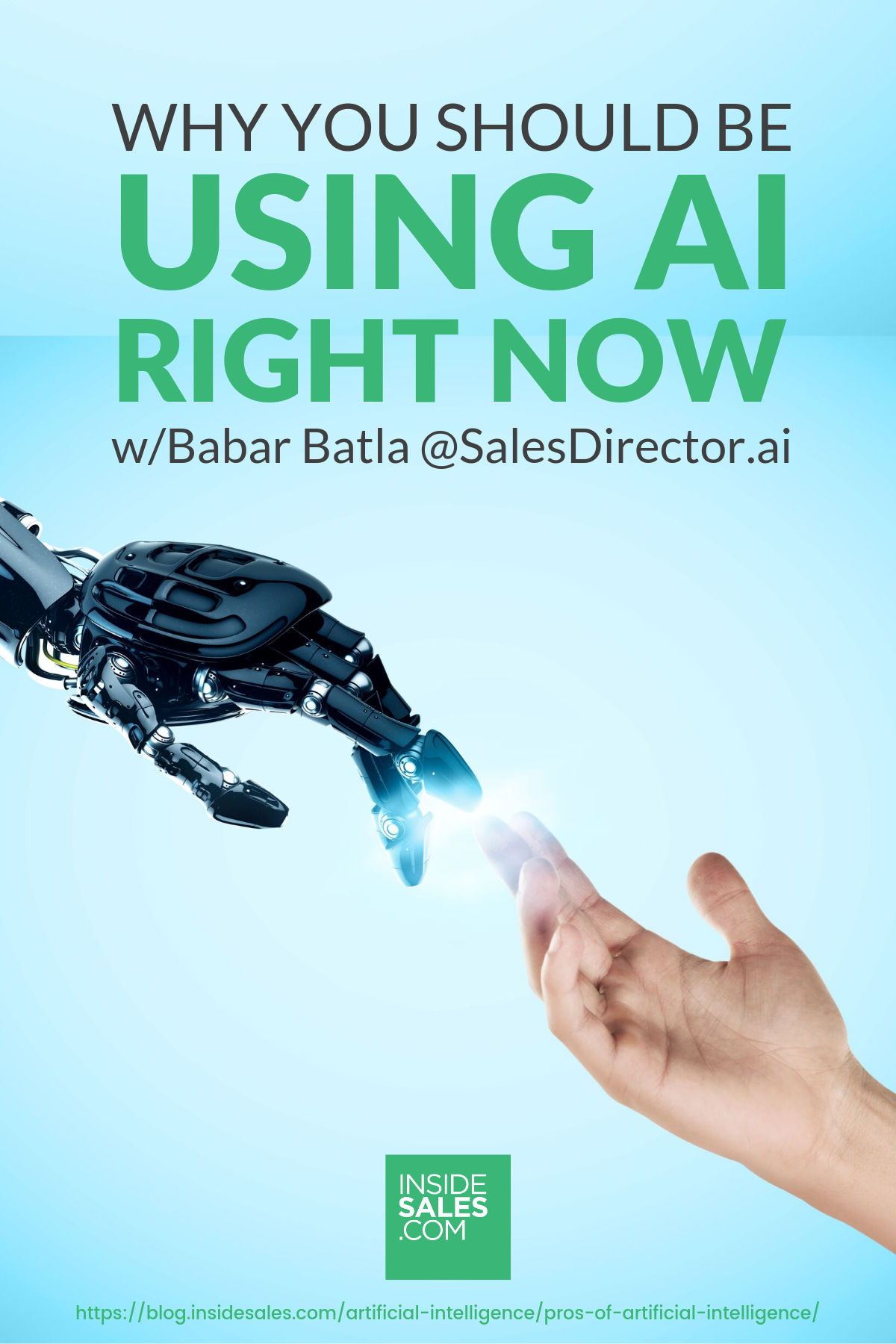Why You Should Be Using AI Right Now w/Babar Batla @SalesDirector.ai
Learn the pros of artificial intelligence and how you can use it for your business from SalesDirector.ai’s CEO Babar Batla. Read on to find out more.
RELATED: Sales AI: The Connection Between Artificial Intelligence and Sales
In this article:
- Misconceptions on Artificial Intelligence
- Applications of Artificial Intelligence in Sales Today
- The Pros of Artificial Intelligence
- How AI Uses Data
- Why Artificial Intelligence Is Seeing Slow Growth in the Market
- Final Advice from Babar Batla
The Pros of Artificial Intelligence | AI Development
Babar Batla is the Co-Founder and CEO of SalesDirector.ai. Prior to taking on this role, Batla spent the last 16 years between Microsoft and Google leading B2B organizations.
Currently, he occupies himself with training their AI system to become the “greatest companion for sales leaders and sales managers.” SalesDirector.ai is a SaaS offering for B2B sales organizations.
What they essentially do is give leaders insight into their business so they can make decisions before it’s too late. They created an AI solution that produces better data, and in turn a better forecast.
Misconceptions on Artificial Intelligence
These days, artificial intelligence (AI) is a buzzword. Because of that, there are a lot of different perceptions on where we currently are in this technological development.
Batla said that he likes to look at AI as a “journey.” Those on the receiving side of AI have a different perception on where we are in this journey.
He has also had his fair share of misconceptions when talking to their customers and prospects. This led Batla to see that there’s confusion in the AI market.
He shared with us some of the questions he commonly receives. For instance, some Sales Managers ask him if the AI can tell them when the deal is going to close.
To that, he says, it’s not possible. This is because there are too many factors outside of the data itself and why deals happen or don’t.
Another question he receives is, can AI make changes to opportunities in CRM? Batla said that this is possible, but he asks the client if they are really ready for it.
Some are also afraid of AI replacing sales reps and managers.
We have all these perceptions and ideal scenarios when it comes to the pros of artificial intelligence and what it can do. Yet we also need to remember that we should balance them all out.
Batla said that it’s important to know if a certain AI task is feasible. It’s also good to ascertain your organization’s willingness to have an AI do things on your behalf.
The perceptions that Batla generally hears from people is within the spectrum of prescriptive AI. Later on, he will share with us what this is all about.
Applications of Artificial Intelligence in Sales Today
As Batla said, it’s good to have a background on what is really possible in the realm of AI today. It also helps to know where we’re headed.
The market is mature when it comes to commercial applications of AI. Batla shared with us the three types of artificial intelligence that we use in sales today:
- Descriptive and Diagnostic AI — Here, AI looks at historical data and figures out what already happened and how these events correlate. One of its capabilities is being able to figure out the characteristics that make a good or bad lead.
- Predictive AI — A lot of people are investing in this, as it allows a system to predict what’s going to happen in the future. For instance, it can predict the likelihood of a certain lead to result in something positive, like a demo or a closed deal.
- Prescriptive AI — It allows the system to suggest the actions a human should take in order to get positive results. For instance, the system can tell you that it’s time to reach out to someone to improve the odds of winning the deal.
SalesDirector.ai focuses on leading the charge in prescriptive AI. It’s also good to note that at some point in the future, sales-related activities will eventually work with a data AI type of engine.
The Pros of Artificial Intelligence

Working with AI for better sales
After learning the misconceptions and applications of AI, we asked Batla about the pros of artificial intelligence.
Where does this technology work in sales and marketing? How are we using AI to improve customer experience and the lives of salespeople and marketers?
Batla enumerated some areas where we see the benefits of AI.
1. Acts as an Assistant for Humans
First, it acts as an assistant and a grunt worker for humans.
AI does all the work that humans either don’t have time for, don’t have the skillsets for, or perhaps the knowledge to do. This is the main value of AI for customers.
2. Helps with Lead Scoring
Lead scoring is also one area where we make good use of AI. Leveraging AI to look at patterns and figure out which lead is better than the other is a straightforward application of the system.
It can analyze data at scale. An average B2B company doesn’t deal only with hundreds of leads, but rather thousands.
Obviously, it’s very tough for humans to continuously do that. Hence the need for an AI system.
RELATED: How Artificial Intelligence Helps Sales Reps Close More Deals
3. Capable of Human-Like Interactions
There are also AI tools that facilitate human-like behavior and interactions. It’s similar to the underneath technology used by Alexa and Siri that mimics a human.
At the end of the day, this advanced technology is only an AI interface using AI technologies.
Batla said that one of the misconceptions on AI is that it’s only capable of human-like interactions. While this is a well-known feature, it’s not the only one out there.
A lot of folks in the corporate world gravitate towards solutions that provide the human-like capabilities of AI. This led Batla’s team to believe that customers think this is the only kind of AI in the market.
4. Helps with Forecast Prediction
Forecast prediction is also one of the pros of artificial intelligence. At the end of the day, the funnel’s goal is to produce output, which is a forecast.
That’s why if you can predict the forecast and make wise decisions before it’s too late, then AI would’ve served its purpose well.
Based on experience and research, Batla’s team discovered that there are fundamental flaws in software companies’ approach towards forecast prediction.
Even with business intelligence (BI), the data principle is “garbage in, garbage out.” If a system is using historical data to predict the future and the data has no causality, it doesn’t provide any meaning.
If you input a bunch of random data into the machine, you will certainly get garbage out.
The most exciting part for Batla and his team is solving the problem on data by making it clean and correct. This way, their customers can input good data into the machine and produce much better insights.
How AI Uses Data

AI using data to produce results
You may be wondering, exactly how important is the role that data plays in artificial intelligence?
As Batla said, data is the “nutrition” you feed AI. Yet the problem now is that there isn’t much focus on getting good data available for the system itself.
Batla thinks that’s a big miss in the market today, but he believes that people who work in tech aren’t ignorant about it. What’s causing this problem is the excessive focus put on making meaning out of data.
Why Artificial Intelligence Is Seeing Slow Growth in the Market
Even with the many pros of artificial intelligence, it still hasn’t taken off the market as fast as you would expect it. Batla shared with us some of the reasons why.
First, it’s a “very complicated thing to solve.” Not because of the technology or the AI required, but rather because of the permutations of the business situations.
Each company has a different forecast approach, and that’s what makes it complicated.
Another curveball is that there is a significant number of sales leaders today who forecast based on holding somebody accountable. They’re not data-driven sales leaders, but rather they are the holding-the-managers-accountable type.
While this is a fine trait to have, it is not feasible for a company whose managers don’t stick around for more than two years. They could face situations wherein it’s too late to course-correct.
That’s the problem with holding people accountable and refusing to utilize machines for assistance.
This type of accountability works when you’ve got five to ten years of tenure for sales leaders. Yet as we see in companies today, this is no longer the case.
Final Advice from Babar Batla
As we wrapped up the conversation, Batla left us with good advice. That is to focus on the business problem at hand and look for a solution to solve it.
He went on to say that we shouldn’t get enamored by the marketing we see. Instead, we should pay attention to our business problem and be critical in finding the right technology that can solve it for us.
If you want to learn more about Babar Batla and SalesDirector.ai, visit his LinkedIn page and their company website. You can also check out their eBook, Demystifying the AI Blackbox, to learn more about artificial intelligence.
As you work towards improving your business and making it more efficient, it is good to know the pros of artificial intelligence. This way, when you’re presented with opportunities, you can opt for the best AI application that will suit your needs.
Who knows — you might find the solution to your business problem in the next AI software you try.
What more would you like to know about sales AI? We’d love to hear from you in the comments section below.
Up Next:
- How AI Is Disrupting Sales w/Damian O’Farrill @Autodesk
- Artificial Intelligence Applied to Sales: What’s Under the Hood of Neuralytics?
- Best Jokes About Salespeople: 18 Stories to De-Stress

